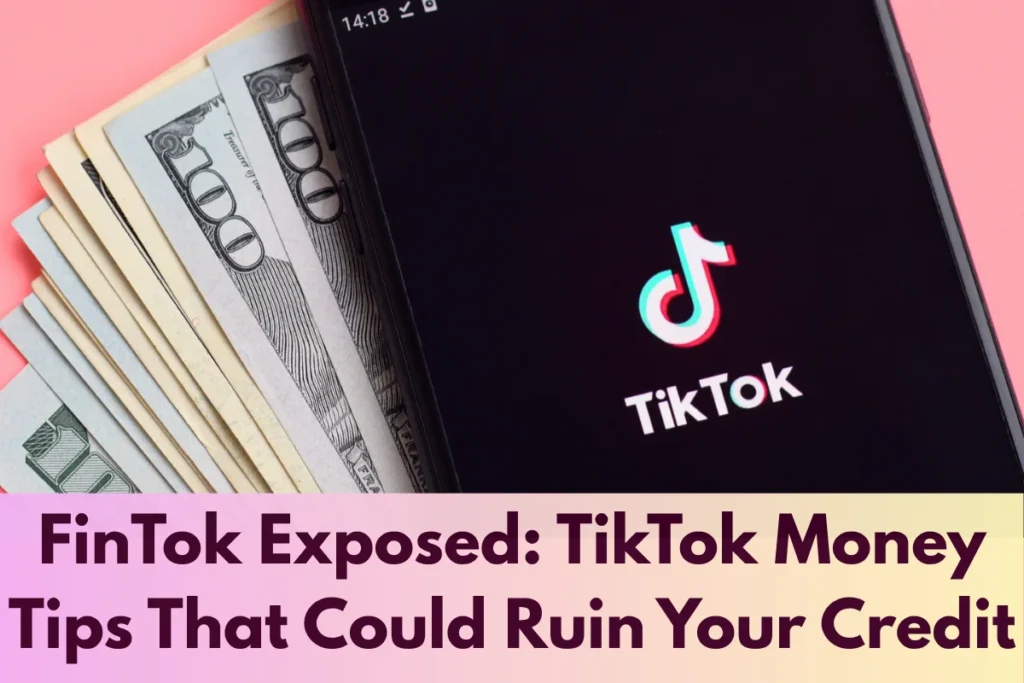Introduction: TikTok Is Teaching Finance—But At What Cost?
TikTok is no longer dancing trends and memes. An entirely new group of influencers has now taken over a niche, which seems to be called FinTok (or Financial TikTok), to have its creators sharing short TikTok tips on making money and how they can gain a sense of financial freedom, passive income, credit tips, and living debt-free.
While some creators genuinely do hard work and share only correct information when it comes to educating people, some are poorly informed and even driven by views and virality but not financial truth.
With the thin line separating entertainment and education blurs, millions, particularly Gen Z and Millennials are just mindlessly following risky advice being given to them without realizing that it might end up costing them their credit ratings. It can put them in debt or worse, land them into legal trouble.
Let us dissect the top most misguiding information on FinTok, analyze its pitfalls, and give you intuitive, harmless solutions.
Before you go, this next article might answer your next question.
What Is FinTok and Why Is It Booming?
There has been an explosion of popularity of FinTok (a sub-category of TikTok regarding personal finance) over the past three years. FinTok succeeds on the platform through its short and sizzling videos, which promise everything from the latest “side hustle ideas” to “credit hacks that nobody knows”.
Key reasons behind FinTok’s rise include:
- Financial anxiety among Gen Z
- Lack of formal education about credit, loans, and budgeting
- Trust in peer-to-peer advice over traditional institutions
- Short attention spans, which make 15–60 second videos appealing
But herein lies the issue: financial literacy can’t be compressed into a catchy clip without sacrificing nuance—and that’s where things start to go wrong.
Viral TikTok Money Tips That Could Ruin Your Credit
1. “Use 10 Credit Cards to Boost Your Score”
This tip asserts that opening a number of credit cards simultaneously boosts your credit line and improves your credit utilization and hence your credit score. The reasoning, though partially true, is highly flawed.
Why it’s risky:
- Applying for multiple credits within a period will result in hard inquiries which will reduce your credit score.
- Unless treated in a responsible manner, a set of cards may also cause the accumulation of debts, as well as missed payments.
- Some cards come with hidden fees, high interest rates, or predatory terms.
Better Tip: Keep your utilization under 30% on existing cards and focus on timely payments. A secured credit card is safer for credit building.
2. “Dispute Legit Debt to Get It Removed”
Another dangerous tip encourages users to file false disputes with credit bureaus, claiming they don’t recognize debts in hopes of getting negative records removed.
Why it’s dangerous:
- Falsely disputing accurate information can be flagged as credit fraud.
- Creditors often re-verify debts, and the dispute won’t remove them permanently.
- It damages your credibility with lenders and may violate legal terms under the Fair Credit Reporting Act (FCRA).
Lying on a credit dispute is not a loophole—it’s fraud.
3. “Pay Your Credit Card Bill 5 Times a Month”
This FinTok tip suggests splitting your credit card bill into multiple payments each month to show low usage and boost your score.
The truth:
Making multiple small payments can be a good strategy, known as “credit card cycling,” especially if you’re trying to keep utilization low. But the way it’s portrayed on FinTok often misses the key details:
- It doesn’t work unless your issuer reports to the bureau before your billing cycle ends.
- Overpaying or paying erratically may confuse auto-debit setups or trigger alerts.
- It doesn’t solve the root issue: spending within your means.
Better Tip: Pay off your card in full before the statement date and monitor your utilization closely.
4. “Get an EIN and Build Business Credit Even If You’re Broke”
Some creators tell young users to form an LLC, get an Employer Identification Number (EIN), and apply for business credit cards—even if they have no business.
Why it backfires:
- Lenders now cross-check business activity with tax and bank records.
- Falsely claiming business activity can result in loan rejections or legal scrutiny.
- Business credit cards often require personal guarantees, meaning your personal credit still takes the hit.
Don’t fabricate a business just to get credit. It’s not a shortcut—it’s a red flag for lenders.
5. “BNPL Won’t Hurt Your Credit—Use It All the Time!”
BNPL (Buy Now Pay Later) is often portrayed on FinTok as free money: no interest, no impact on credit, and no downside.
But as explored in our blog on BNPL risks, it’s far from risk-free.
Reality check:
- BNPL platforms increasingly report late payments to credit bureaus.
- Missed EMIs can hurt your credit score.
- Overuse encourages impulse spending and untracked debt.
Use BNPL only for planned, essential purchases—and never miss a payment.
Why These “Tips” Go Viral Despite the Risk
TikTok’s algorithm rewards bold claims, virality, and relatability—not accuracy.
That means creators who simplify or exaggerate financial advice often gain more visibility than qualified professionals. The financial system is complex, but TikTok favors simplicity. Unfortunately, bad advice often spreads faster than good guidance.
Real Consequences: How a Teen Lost Their Credit Potential Early
Aayush, 19, followed a viral FinTok tutorial to build business credit with fake documentation and got approved for two small cards. He overused them, missed payments, and tried to dispute the charges when contacted by collections.
Result?
- His CIBIL score dropped to 580.
- He’s now blacklisted by two major lenders.
- When applying for a student loan, his application was rejected due to poor credit.
FinTok didn’t mention any of this.
How to Differentiate Right TikTok Money Tips from the Bad
Not all TikTok finance creators are irresponsible. Some, like licensed financial advisors or debt counselors, post genuinely helpful and ethical advice. So how can you tell which is which?
Red Flags to Avoid:
- Promises of “instant” credit boosts
- Tips involving legal gray areas or deception
- Advice without context or disclaimers
- Encouragement to take loans or credit you don’t understand
Green Flags to Trust:
- Creators who mention risks clearly
- Professionals with credentials in finance or economics
- Videos citing official sources (RBI, SEBI, credit bureaus)
- Emphasis on long-term planning over hacks
Safer Alternatives to Viral Credit Advice
If you’re looking to improve your credit, manage money, or get out of debt, here are sustainable alternatives:
1. Track Your Expenses
Use a budgeting app or a simple spreadsheet to stay aware of where your money goes for TikTok money tips. Awareness curbs overspending.
2. Use Credit Cards Responsibly
Keep balances under 30% of the limit, pay in full monthly, and avoid cards with hidden fees.
3. Build Emergency Savings
Aim for at least 3–6 months of expenses in a liquid savings account.
4. Check Your Credit Report
Use sites like CIBIL or Experian once every quarter to monitor your score and activity.
5. Follow Certified Financial Educators
Seek information from people with verified expertise, not just popularity.
Final Thoughts: Financial Literacy > Financial Virality
TikTok may be fun and fast, but your credit is serious business. The wrong TikTok money tips can haunt your finances for years. As the popularity of FinTok grows, so does the need for critical thinking and trusted information.
If you’re on TikTok, scroll smarter:
- Double-check advice
- Ask for sources
- Remember your long-term goals
Because when it comes to your money, credibility matters more than virality.
FAQs
1. Can TikTok really damage your credit?
Yes—if you follow poor advice from FinTok without verifying it. Tips that seem easy or too good to be true often are.
2. Are there any trustworthy FinTok creators?
Yes, but they are usually financial educators, planners, or professionals with transparency about their background. Always verify their credentials.
3. What are safer ways to build credit?
Start with a secured credit card, pay bills on time, maintain low utilization, and monitor your credit report regularly.
4. Should I use business credit if I don’t have a business?
No. This is unethical and can lead to legal trouble and financial penalties.
5. What if I’ve already made mistakes from TikTok advice?
Don’t panic. Stop using risky strategies, start repaying what you owe, and seek professional help from a credit counselor or certified advisor.
Curious hearts and bright minds—follow the path to more wisdom on Management Works Media.






